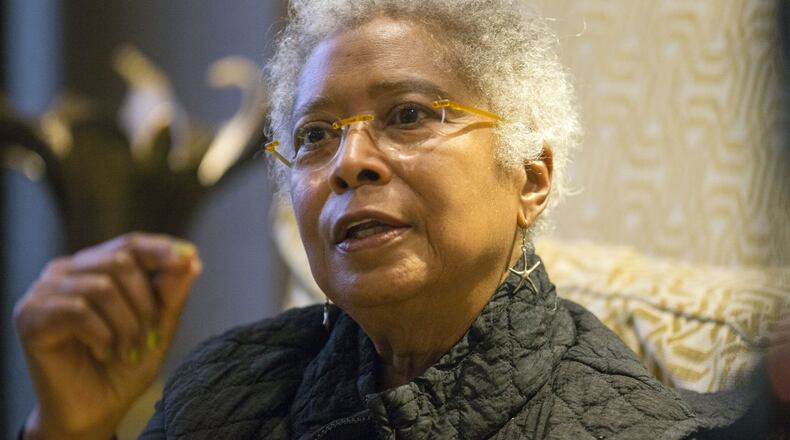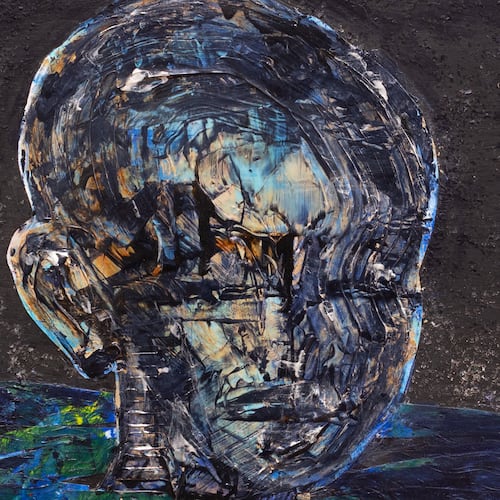Why won’t Alice Walker allow commenting on her blog?
Commenters generally have a bad attitude, she said. Then there’s the spelling.
Though she considers social media a “surveillance” tool, and was only “dragged” into Facebook by her friends, Walker loves her blog, where she posts new poems and social criticism.
But she won’t mess with trifling people who can’t distinguish between “their” and “they’re.”
“Their spelling is a disaster and this makes me sad, too,” she said, “because I can see that the educational system, such as it is, is really failing people, and that is tragic.”
Walker, 74, social activist and the Pulitzer Prize-winning author of “The Color Purple,” visited Atlanta this week to speak at Agnes Scott College’s Gay Johnson McDougall Symposium on Race, Justice and Reconciliation.
She addressed a standing-room-only crowd at Presser Hall, where she ranged from conspiracy theories to poignant recitations of new and old poems, including a meditation on visiting Nelson Mandela's prison cell at Pollsmoor in South Africa.
Walker also spent time with the AJC afterward to talk about why she mistrusts vaccines, and what she learned from psychedelic plants and single-gender schools.
Her audience at Agnes Scott included rising senior Sam Mooney, who brought Playbills from the Broadway and touring versions of "The Color Purple," hoping to get them autographed. "To meet her in person," said Mooney, "I'd be honored."
Walker was dressed all in black. Her hair, once dreadlocked, was close-cropped in a graying natural. After her remarks, she sat on stage in conversation with University of Georgia professor Valerie Boyd, who is editing a compilation of Walker's journals, "Gathering Blossoms Under Fire."
Looking back at her journals, Walker told Boyd, she noticed a recurring motif. “I hate debt. Part of my struggle was not to get into debt.”
She also saw that other artists who get into debt “start to feel that you have to do stuff for money, and then you drink a lot to forgive yourself for doing that.” Neither activity is healthy.
Boyd asked about Walker's reaction to the film "Black Panther," which Walker praised, though it was "too violent." It also distracted viewers from other pursuits. "More people focused on that movie than on Winnie Mandela's funeral," Walker said. "That's what entertainment does: We end up falling for a fiction when the truth is so much more incredible."
Later, Walker spoke to the AJC about the benefits of attending a single-gender college, saying she found Sarah Lawrence less stifling than Spelman.
“Spelman tried to be a nunnery, but it didn’t work,” she said, sitting in a meeting room at the Ritz-Carlton Atlanta downtown. “The president went around in the evenings, poking into the bushes to see if we were doing something we shouldn’t do.”
The almost all-white Sarah Lawrence was freer, but lonelier. “I made good use of my loneliness,” she said. “I wrote. I wrote and I studied.” By the time she graduated, she had secured her first book contract.
Colleges for women are crucial, she said, “because I think women have so little space of their own in the culture.”
About distrusting vaccines, she said, “We have been made guinea pigs of; we have been deliberately infected with syphilis. There are many of us who believe that the AIDS virus was caused by humans in Africa. I just am very suspicious. I think you should always doubt people who have never really helped you before.”
She also elaborated on comments that went even further from the mainstream, endorsing the writings of British former sports announcer David Icke, who posits that the Earth is controlled by shape-shifting reptilians of extraterrestrial origin.
“David is actually brilliant, and I think people should listen more to what he has to say,” she said. Reptilians? “What about it? My parents always said that the white people around us were like snakes, because of the way they treated us.”
Her meeting with a shaman in the Amazon, and her experience with a mind-altering ayahuasca brew, convinced her that our plants need help. We can help them, she said, by opposing war, and by living more closely to the earth.
Walker herself lives “in the woods, way far from San Francisco, in an apple-growing community. I grow everything I can, including chickens.”
As a final word, she offered this advice: “Understand that we are at a precipice, as a world. Do your best to do your part to help us not fall off the edge.”
About the Author
Keep Reading
The Latest
Featured






